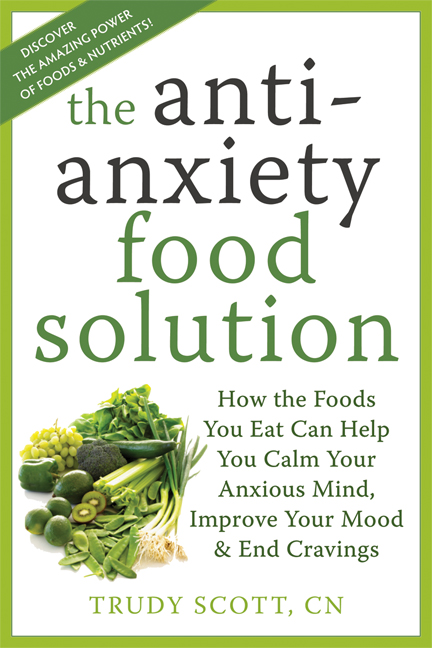
Here are a selection of quotes and facts from each chapter of the book: The Antianxiety Food Solution: How The Foods You Eat Can Help You Calm Your Anxious Mind, Improve Your Mood and End Cravings.
Introduction: “There’s a reason why I’m so passionate about working with people with anxiety and why I’m writing this book. I’ve had my own personal journey with anxiety…” Chapter 1: Figure Out Your Optimum Antianxiety Diet There are 4 antianxiety diets but “Eating real, whole, good-quality food is the foundation of this book and any program to prevent and alleviate mental health issues such as anxiety….” Chapter 2: Avoid Sugar and Control Blood Sugar Swings “Sugar and alcohol may contribute to elevated levels of lactate in the blood, which can cause anxiety and panic attacks” Chapter 3: Avoid Caffeine, Alcohol, and Nicotine In a study, “…those with panic disorders experienced increases in symptoms such as nervousness, fear, nausea, heart palpitations, and tremors after consuming caffeine and said the effects were similar to how they felt during a panic attack…” Chapter 4: Address Problems with Gluten and Other Foods “Clinical experience and specific studies support the connection between gluten and anxiety, social phobia, depression, and even schizophrenia” Chapter 5: Improve Your Digestion “…people with digestive complaints such IBS, food allergies and sensitivities, small intestinal bacterial overgrowth and ulcerative colitis frequently suffer from anxiety and…depression.” Chapter 6: Balance Brain Chemistry with Amino Acids “GABA plays a major role in anxiety, and serotonin plays a role in at least some types of anxiety…. The great thing about supplementing with amino acids is that you’ll get immediate feedback: positive effects, adverse effects, or no changes at all.” Chapter 7: Address Pyroluria or Low Levels of Zinc and Vitamin B6 “Low levels of zinc and vitamin B6 are frequently associated with a type of anxiety characterized by social anxiety, avoidance of crowds, a feeling of inner tension, and bouts of depression” Chapter 8: Other Nutrients, Hormone Imbalances, Toxins, Medications, & Lifestyle Changes “Mild to moderate deficiency of vitamin C may be associated with increased nervousness and anxiety… Supplemental magnesium together with vitamin B6 was shown to alleviate anxiety-related premenstrual symptoms, as well as breast tenderness and menstrual weight gain…” As you can see, there are many factors that can affect how anxious you feel and since we are all biochemically unique it’s important to figure out and address what may be triggering your anxiety, mood issues and associated cravings. © 2011 Trudy Scott
Sounds like an extremely information packed ready Trudy – cant wait for it to be released!
Heidi Alexandra
Sounds like it’s going to be jam-packed with info! Love it!
Thanks, Trudy!
Trudy, you have really covered all the bases. Nice work!
Great overview Trudy, it’s going to be a best seller!
Thanks Sheila and lets hope so – it’s so needed and I’m thrilled to be helping so many who suffer with unresolved anxiety
Thanks for the reminder. I have some room for improvement.
Write on!~
Lisa
Too funny Lisa but always happy to provide friendly reminders